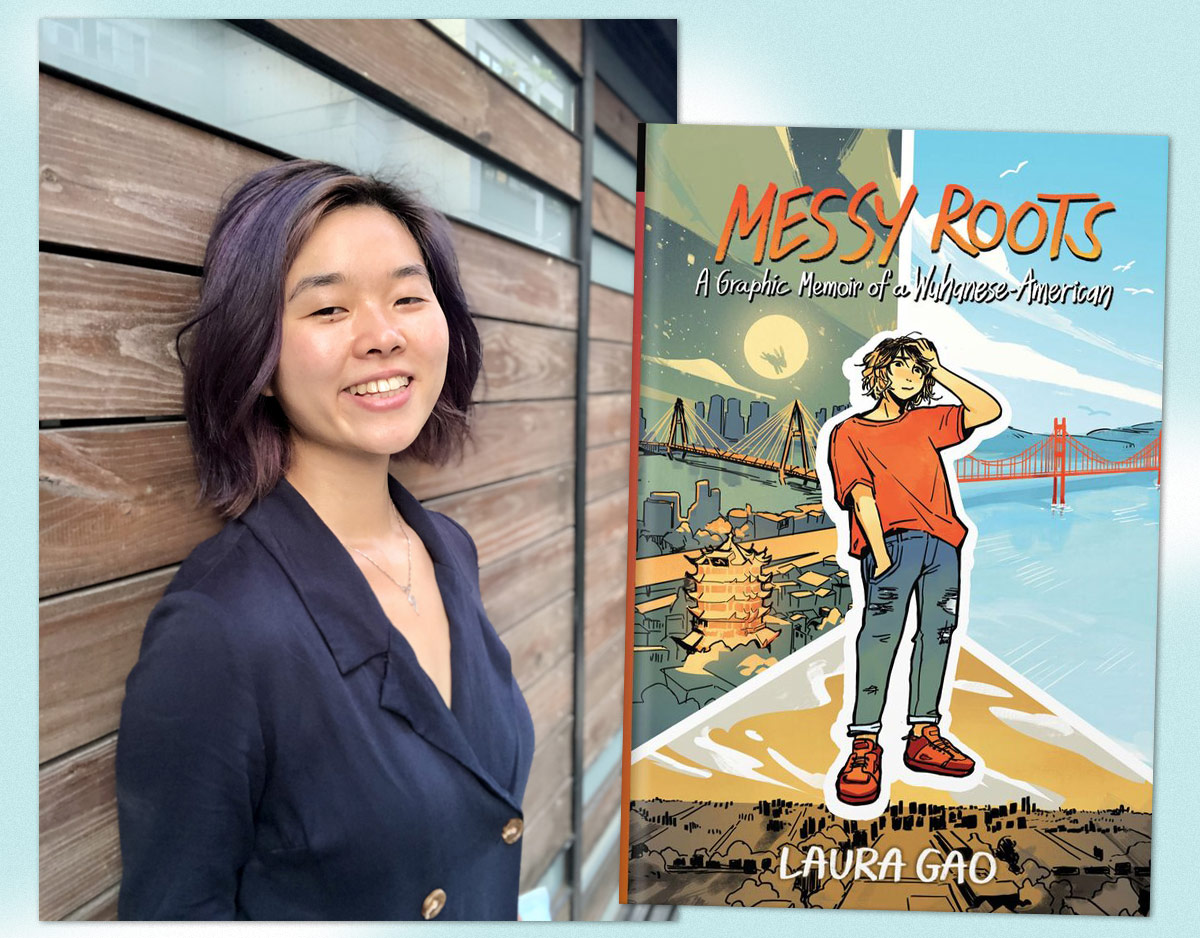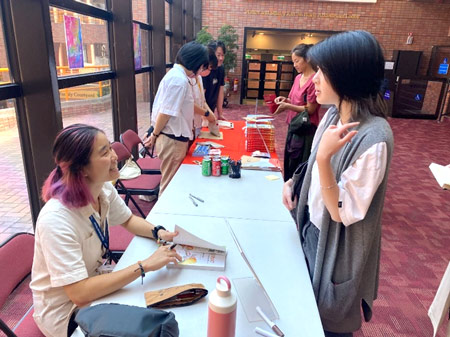The Impact and Importance of Author Visits in Challenging Times
A week-long school visit from Messy Roots creator Laura Gao highlighted the need for students to see the work of marginalized communities and hear from the creators themselves.

Last fall, I coordinated a visit with Laura Gao, author of Messy Roots, at the American high school in Taiwan where I was the librarian. Since its publication, Gao's graphic memoir—which explores her journey of self-discovery as a queer Wuhanese American—has both resonated deeply with audiences and been the target of book challenges.
For one busy week last October, Gao gave multiple presentations and led our English, art, and creative writing classes in joyful and inspiring workshops. Her visit was a transformative experience for many students, highlighting the critical importance of hosting author visits by diverse voices, despite increasing pushback in many school districts.
Messy Roots was on our 9th-grade reading list before Gao’s visit because of its themes' relevance to the curriculum and our student body. The graphic memoir addresses issues of identity, belonging, and the complexities of growing up as an immigrant in America, specifically one from Wuhan, the target of much anti-Asian sentiment during the pandemic. As an American school in Taiwan where every student has a foreign passport, many students straddle multiple cultures. Gao’s visual storytelling not only provides a window into her specific experiences but also invites readers to engage with broader themes of acceptance and resilience. Yet despite the book’s value, Messy Roots has joined numerous other titles with LGBTQIA+ content facing challenges and bans across the United States.
 |
Author Laura Gao signs copies of Messy Roots during the school visit. |
School librarians play a crucial role in combating this wave of censorship. It might be tempting to skip over authors like Gao when planning events to avoid possible pushback and controversy. But it’s more important than ever to promote diverse authors and facilitate discussions around their work. One of the key aspects of our mission as librarians is to create inclusive environments that encourage students to explore different perspectives.
When I started as a librarian at this school, the PTA was in charge of funding author visits and I was denied a grant request for an author of color who focused on social justice. Parents should not be the ones dictating which authors get to visit a school. Librarians, in collaboration with teachers and administrators, should choose these visits to support the curriculum and the school’s mission and vision. Over my three years at the school, I advocated for a funding source unattached to parents’ money or veto power. The change was made and funding found by eliminating some resource subscriptions due to low usage. That money was used to create a new library budget line for author visits.
Having a visit with an openly queer author felt particularly urgent to me because the year before Gao’s visit, a school board member challenged the inclusion of Gender Queer by Maia Kobabe in our school library. (I created a comic about that experience.) Fortunately, with the support of our principal in light of our selection and reconsideration policies, the book stayed on the shelves. But the experience reinforced for me how much these books, and the LGBTQIA+ community at our school, need advocacy and visible support, not just from members of that community, but also from allies.
[READ: Disinvited: Amid Censorship, Schools Abruptly Cancel Author Visits]
The week of Gao’s visit our school was devastated by the news of a student's suicide. We can never know their reasons, but in my 20s, I lost a close friend to suicide, and this loss hit me hard. I thought the author's visit might be canceled, but it went on as scheduled and turned out to be just what we all needed as we reeled from the tragic loss of a member of our school community.
Our school includes PreK-12th grade on one campus, with more than 2300 students total. The high school population is nearly 1,000, and in a busy school one-off presentations rarely make the same impact as having an author embedded in classes. An English teacher and I collaborated in the planning of Gao’s visit to try to include as many opportunities for students to engage with her as possible. I reached out to other international schools in the area and coordinated a tour so we could share her travel costs as well as expand her reach. We were lucky to be able to schedule her on campus for five days.
We invited English and art teachers, including at the middle school level, to choose from one of the handful of workshops Gao offered that include fun, interactive 30-45-minute comics writing exercises for a variety of ages and skill levels. She ended up doing a variety of 16 workshops, two large presentations with book signings supported by a local bookseller, a smaller lecture, and two lunches with student clubs in five days. It was an intense schedule, but Gao was an unflappable enthusiastic professional who seemed to take it all in stride and was so present to the students in each event.
Attendees of Gao's workshops and presentations reflected on how her visit impacted them. One student appreciated how “her visit was nuanced in connecting her cultures” and also liked “the way she used humor in her book and in her presentation.” Many students from the LGBTQ+ Club and the AAPI student group attended a special talk she gave entitled Bridging Two Cultures and Queerness and one teen excitedly remarked that they'd “never experienced anything like that in school before.”
Gao’s emphasis on finding joy in her identity along with her cool wit, calm confidence, and youthful banter instantly connected with students. They flocked to get their books signed and to chat with her afterward. The much-needed joy during a week of mourning was palpable. Gao’s visit earned a double-page spread in the school yearbook in the spring, the ultimate vote of approval by students determining what is important enough to take up space on those precious pages, and underscoring the significance of the power of personal narratives to help young readers feel seen.
The students’ reception to Gao’s visit reminded me how much author visits are an essential and powerful avenue to expose students to the diversity of our world and build a culture of community and empathy. Students who connect with stories that reflect their own experiences gain the confidence to embrace their identities and challenge societal norms. As the adults with the power to make decisions about what voices get to be heard in the school setting, we should model the courage to advocate for diverse perspectives. Engage with critics of diverse literature and attempt constructive conversations. Stand firm against self-censorship and promote works that reflect the realities of marginalized communities (not just stories of harm to these communities but also of joy).
Coordinating author visits can be a costly and time-consuming endeavor, including the emotional lift if you are pushing against resistance, but the effort is well worth it for your students.
 Cassy Lee is a librarian and comics creator from California living and working in Taipei. She is taking a sabbatical from her 20+ year career in education and librarianship to work on her graphic novel in the MFA in Comics program at California College of the Arts. She was SLJ's 2018 Champion of Student Voice.
Cassy Lee is a librarian and comics creator from California living and working in Taipei. She is taking a sabbatical from her 20+ year career in education and librarianship to work on her graphic novel in the MFA in Comics program at California College of the Arts. She was SLJ's 2018 Champion of Student Voice.
RELATED
The job outlook in 2030: Librarians will be in demand
The job outlook in 2030: Librarians will be in demand
ALREADY A SUBSCRIBER? LOG IN
We are currently offering this content for free. Sign up now to activate your personal profile, where you can save articles for future viewing






Add Comment :-
Be the first reader to comment.
Comment Policy:
Comment should not be empty !!!